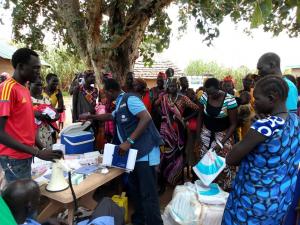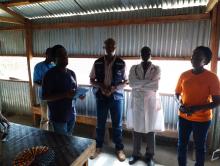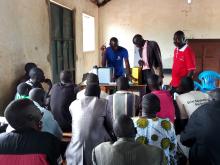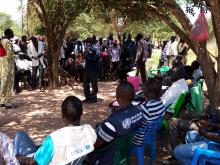WHO is using strategic approaches to provide lifesaving health and nutrition services in hard to reach areas of South Sudan
13 October 2018, Juba – In an effort to provide quality emergency health services including basic package of health and nutrition services, WHO is implementing an integrated health, nutrition and WASH services to save the lives of populations at risk.
To reach people with virtually no health, WHO deployed the mobile medical team (MMT) to priority locations across the country to provide and contribute to quality emergency health services including basic package of health and nutrition services in a prompt and effective manner to populations at risk.
The teams depend on WHO’s emergency health kits including interagency emergency health kits (IEHK), cholera kits, severe acute malnutrition with medical complication kits (SAM/MC kits), trauma kits, surgical supply kits, and pneumonia kits to provide basic health care.
In the last six months, with support from the South Sudan Humanitarian Fund (SSHF), WHO deployed the mobile medical team to Bentiu, Rumbek Centre, Rumbek East, Wulu, Yirol East, Yirol West, Torit, Yei, and Yambio. The team verified disease alerts and conducted investigations for increasing cases of malaria, Rift Valley Fever, and a suspect case of Ebola in Yambio. The team also provided technical support including training of trainers for the measles campaign in Yirol East and Yirol West as well as monitoring and supportive supervision to the oral cholera vaccination campaign in Torit. In Bentiu POC the MMT worked with two partners to conduct clinical consultations following a seasonal upsurge in the caseload of malaria, respiratory infections, and diarrhea.
This remarkable progress is the result of sustained funding from the South Sudan Humanitarian Fund (SSHF), says Dr Olushayo Olu, WHO Representative for WHO South Sudan. Despite many challenges accessing locations, we are able to reach internally displaced persons and communities in hard to reach areas to reduce preventable illness and death due to communicable diseases including the health impact of the current nutrition emergency through integrated health/nutrition/WASH interventions for stabilization centers in areas with the highest burden of acute malnutrition.
As part of its emergency response activities to scale up proven interventions, WHO trained over 200 participants from Health and WASH clusters on water quality and infection prevention and control (IPC) in health facilities in Bentiu, Malakal Wau and Juba; over 80 health workers on case management of severe acute malnutrition with medical complications in Warrap, Unity, Jonglei, Eastern Equatoria and Western Bahr El Ghazal, and established 30 facility based MUAC surveillance and referral sentinel sites in priority counties.
Conflicts and insecurity have maintained South Sudan in a chronic humanitarian crisis. Since December 2013, WHO in partnership with health cluster partners is providing lifesaving activities to displaced people.






